Originally young and robust, the ninth incarnation of the Doctor, christened the War Doctor by Alice Obiefune, set upon the warrior path for which he had been intended, and disavowed the name "the Doctor". Though the Time Lords and Daleks continued to refer to him by that name, he was also referred to as "the Warrior", the "Doctor of War", and "the Renegade", but, as far as the Doctor was concerned, he had no name.
As he fought alongside the Time Lords, he became regarded as a war hero who commanded a great deal of respect from the Time Lord military. Gastron stated that, during the Time War, the War Doctor was noted for going into battle unarmed, but winning nonetheless, with his unarmed state being the last thing many saw.
After becoming old, battle-weary and faced with the end of reality, the Doctor considered activating the Moment to end the Time War by committing genocide against both the Daleks and his own people. However, the Moment's sentient interface led him down a different path by letting him view his future first-hand. By teaming up with his future selves, his mind was opened to a peaceful way to end the Time War in lieu of the deadly alternative he was going to enact. Teaming up with past and future incarnations, the War Doctor helped to save Gallifrey from destruction; although he was not able to retain these memories, believing himself to have destroyed Gallifrey due to the timeline being out of sync.
After departing from his future incarnations' company, and once again embracing the name of "the Doctor", this incarnation regenerated into a younger body due to advanced old age.
Biography
A day to come
The First Doctor would occasionally have premonitions of his future incarnations. (PROSE: A Big Hand for the Doctor)
After the First Doctor was diverted from the South Pole, (AUDIO: The Bonfires of the Vanities) he learned from the Player that "forces from the future" were interfering with the Doctor's history to stop him from becoming an incarnation that would play a key role in the future conflict. (AUDIO: The Plague of Dreams)
The First Doctor was referred to as "the Doctor of War" by the Testimony, who also showed him footage of the War Doctor, as well as his ten other successors when he expressed doubt over the Twelfth Doctor's identity. (TV: Twice Upon a Time)
Mawdryn attempted to force the Fifth Doctor to use up his eight remaining regenerations to end his follower's cycle of perpetual rebirth, but this was rendered unnecessary when Alistair Gordon Lethbridge-Stewart made physical contact with his younger self and a discharge of temporal energy was released that allowed Mawdryn and his followers to die. (TV: Mawdryn Undead)
After the TARDIS became "stalled in the equivalent of a galactic lay-by", the Sixth Doctor had a worried thought of Peri Brown growing old and dying in the TARDIS, while he would "go on regenerating until all [his] lives [were] spent." (TV: Vengeance on Varos)
When the Tremas Master exposed the Valeyard's alliance with High Council to the Sixth Doctor at his trial, he revealed that the Valeyard was acting as the prosecutor for the trial in exchange for the Doctor's remaining regenerations. (TV: The Ultimate Foe)
When Ace was sent into the Seventh Doctor's mind, she discovered a room with thirteen cubicles, seven of them empty, while the other six contained shadowy white figures, representing the Doctor's future incarnations. (PROSE: Timewyrm: Revelation)
After sealing Gallifrey away in a pocket universe, (TV: The Day of the Doctor) the Seventh Doctor was able to recall teaming up with his other twelve incarnations to save Gallifrey. (AUDIO: Cold Fusion)
After using a Deathworm Morphant to possess a human body, the Bruce Master tried to use the Eye of Harmony to steal the Eighth Doctor's remaining regenerations to heal himself, but his plans were foiled when Grace Holloway sent the TARDIS' into a temporal orbit. (TV: Doctor Who)
The Eighth Doctor nearly regenerated after being wounded by the explosion in the Mukabi laboratory, the associated chemical release eradicating the Fear in his system. (PROSE: Fear Itself)
After his chest was crushed by sandbags, the Eighth Doctor experienced a coma fantasy where he was walking through a series of corridors, troubled by the sensation that his body was a coat that he had taken off and he would find another one around a corner. However, his connection to Sabbath Dei prevented the Doctor from regenerating due to his second heart beating in Sabbath's chest keeping the Doctor alive as well. (PROSE: Camera Obscura)
Prior to his arranged execution on Tor-Ka-Nom, the Eighth Doctor told the attending priest that he believed in reincarnation, but that he had "a nasty feeling it [was] not going to apply [that] time." The execution was successfully avoided due to Izzy Sinclair's intervention. (COMIC: By Hook or By Crook)
After the Eighth Doctor was stabbed in the chest by the Master, Izzy implored him to regenerate, but the Doctor told her that the Master had used a certain energy that inhibited the regeneration. The Doctor was healed by Kroton when he became the controller of the Glory. (COMIC: The Glorious Dead)
After being wounded in a duel with Sebastian Grayle, the Eighth Doctor initially asked Charley Pollard if he had "changed", but was assured that he looked no different. (AUDIO: Seasons of Fear)
When Charley stabbed the Eighth Doctor when he was under the influence of Zagreus, the Doctor resisted the regeneration due to his desire to die. After talking with manifestations of his three predecessors, the Doctor was able to undo his death by surrendering to the forces of Anti-time that empowered Zagreus. (AUDIO: Zagreus)
When his memory began to fail, the Eighth Doctor took it as a sign that he would regenerate soon. (PROSE: The End) Before the Last Great Time War, the Doctor knew he would regenerate again. (PROSE: Museum Peace) Cardinal Ollistra threatened to shoot the Doctor on a Gallifreyan Military Moon Base, believing she would have better luck convincing his next incarnation to fight in the Time War. (AUDIO: The Conscript)
Regeneration

The War Doctor at the start of his life. (TV: The Night of the Doctor)
When the Last Great Time War erupted, the Eighth Doctor refused to fight in the conflict, instead helping out its victims wherever he could. (TV: The Night of the Doctor) In the Fifth Segment of the War, (PROSE: The Stranger) he discovered a woman named Cass trapped aboard an out-of-control starship, inbound for the planet Karn. He attempted to rescue her from the vessel, but Cass rejected his offer due to him being a Time Lord. He refused to leave her, letting himself die with her as the ship smashed into Karn's surface.
However, he was revived by the Sisterhood of Karn, who offered him the ability to control his regeneration and become the person he needed to be in order to end the Time War. Initially, he refused, but after seeing Cass' corpse, on top of the many other tragedies of the Time War, the Doctor's spirit finally broke. Accepting their help, he drank a specially-made formula of the Elixir of Life and regenerated into the warrior the Time War needed. The new Doctor promptly rejected his name, declaring, as he picked up and donned Cass' bandoleer, "Doctor no more", (TV: The Night of the Doctor) renaming himself "the Warrior" for a time. (PROSE: The Stranger)
Entering the fight
Sontarans told legends of the Doctor leading the Time Lords into battle, (TV: The Sontaran Stratagem) with soldiers like Gastron serving with "the Doctor of War" on Skull Moon, (TV: Hell Bent) where the Doctor took command of the slaughter (PROSE: The Day of the Doctor) and became known as the "Butcher of Skull Moon". (TV: Twice Upon a Time) Likewise, the Daleks became frightened of his mere presence in the war (TV: The Day of the Doctor) and referred to him as "the Predator". (PROSE: Engines of War)
Despite often fighting alongside the Time Lords, or leading them into battle, (PROSE: The Day of the Doctor) and certainly opposing the Daleks, (AUDIO: The Heart of the Battle) the War Doctor believed he fought only on the side of the innocents, collateral victims caught in the crossfire of terrible weapons from both sides. (AUDIO: Legion of the Lost)
Alliance with Fey
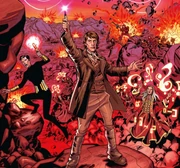
The War Doctor, as a young man, fights on the front line of "the worst day of the Time War". (COMIC: The Clockwise War)
Early in his time fighting in the Time War, the Doctor recruited Fey Truscott-Sade from World War II to join him in the conflict.
On the "worst day of the Time War", the Doctor, Fey and the Sisterhood of Karn fought the Morlontoa of the Seventh Sky on the Dorian Nexus. The Doctor constructed a machine that would fire pulses of pure reason at the creature to defeat it. While this was happening, Fey ordered Time Lord Captain Dolios to get the childlike inhabitants of the planet, the Loshann, to a TARDIS. The Sisterhood was then struck by a stream of pure chaos, leading the Loshann to be hit by the spores of the Morlontoa. They were quickly inverted, turned into monsters and attacked. To save themselves and other Loshann on the planet, the Doctor ordered Fey to shoot each of the Loshann. After she did so, the Doctor's machine to save the planet failed, and the planet would fall anyway, rendering Fey's killing of the Loshann meaningless.
While the planet was saturated by the spores, the Doctor ordered his allies back to his TARDIS. However, Fey instead went to save a child in the wreckage and was touched by the spores before she could return to the TARDIS. Unable to save her or the child, the Doctor could only watch from the TARDIS as Fey melted away. Ohila attempted to comfort him by telling him that he did all that he could, but the Doctor only responded in anger at being addressed by his name. (COMIC: The Clockwise War)
Fighting on the front line
Info from The Third Wise Man needs to be added
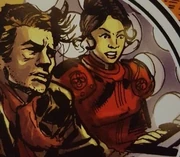
The Doctor and Petrella witness a Dalek ambush. (COMIC: Ambush)
With fellow soldier Petrella by his side, the Doctor joined a fleet of Battle TARDISes in an attack against the Daleks, only for the Battle TARDISes to be ambushed by a Dalek weapon. Realising they had been fed intelligence by the Daleks to draw him out, the Doctor headed for Gallifrey to have a word with Rassilon. (COMIC: Ambush)
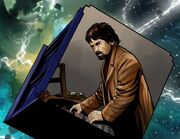
The Doctor is trapped in the Void. (COMIC: The Lost Dimension)
When the Void began to attack and devour the universe, the War Doctor became trapped with his first seven incarnations after the escape of the Eighth Doctor. He was followed shortly by his ninth, tenth and twelfth incarnations, who ventured into the Type 1 TARDIS responsible for the disturbance. Forming a plan with the trapped Eleventh Doctor, the Doctors joined their TARDISes to pacify the Type 1 into a peaceful state and return the universe to normal. (COMIC: The Lost Dimension)
As the war continued, the Doctor slowly aged into an old man as he fought the Horde of Travesties, the Army of Meanwhiles and Neverweres, and the Skaro Degradations and their kin. (PROSE: A Prologue) He also bore witness to the "Seven Deaths of Davros". (PROSE: The Day of the Doctor)
After the Nightmare Child was destroyed by Davros, (PROSE: The Third Wise Man) the Doctor made arrangements for it "to never arise and [to] forever be aware of its non-existence". (PROSE: Twice Upon a Time)
Dealing with the Volatix Cabal
The Doctor took on the Squire as a companion, showing her the prose of Marcel Proust during their travels. (COMIC: The Then and the Now) With the Squire, the Doctor led a Shrikefleet against a Plasma-Wheel armada on Vexa, held the line against six Barrage-Leks and routed the exotic plunder at the chronofracture on Borun, and threw down the Heisenberg mutations on Kether Prime. (COMIC: Pull to Open)
After it was rumoured that the Daleks had recruited the Cyclors before they could, the War Doctor was sent by the Time Lords to deal with the situation. (COMIC: Pull to Open) He formed a pact with the Master (COMIC: The Organ Grinder), and the duo went to Veestrax, where they found a wall with the phrase "Exterminhate" on it. Though he originally planned to blow the planet up, the Doctor instead transported part of Veestrax to another part of the universe in order to wipe out three Dalek assault battalions. (COMIC: Outrun)

The Doctor and the Squire during the Time War. (COMIC: Kill God)
The Doctor, the Master and the Squire landed on the Overcast homeworld, Golgauth, where the Doctor planned to neutralise the Cyclors. (COMIC: The Then and the Now, The One, The Organ Grinder) The duo soon encountered the Volatix Cabal, together killing one of its members. (COMIC: The Organ Grinder) After defeating one of the groups, the Doctor was then shocked to see the Master's TARDIS crash land near him, piloted by Alice Obiefune, a woman who claimed to have time travelled from after the War had ended. Alice was captured by mechanic tentacles, which brought her underground to a base of the Dalek mutants. (COMIC: First Rule) The Doctor sent the Squire to save Alice and afterwards the team left in the TARDIS to an Overcaste rebel base.
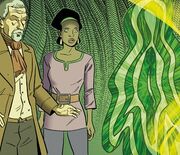
The Doctor creates the Then and the Now with the Psilent songbox. (COMIC: Fast Asleep)
Using the psychic paper as a test, they succeeded in uncovering a Volatix spy within the group but were too late in stopping him from summoning a Cyclor to their location. (COMIC: The Organ Grinder) They ran from the Cyclors, and the Doctor soon realised that Alice had stolen the Psilent songbox from him as she fled from the scene. The Doctor and his companions caught up with Alice, who refused to hand over the Songbox. Alice used the Songbox and banished the Cyclors to a higher dimension. Unbeknownst to the Doctor, the Master had attempted to flee in the version of his TARDIS that Alice brought from the future. The Master's actions created a paradox that reacted with the Songbox, which in turn began to collapse timelines, resulting in a chronal meltdown. (COMIC: Kill God) The Doctor used the temporal dart that had been inside Alice to reverse its origins, creating the Then and the Now. He placed Alice inside the creature and sent her back to her own time, and then stamped on the Songbox to end the madness. (COMIC: Fast Asleep) The paradox caused the Doctor to forget everything about Alice, the Cyclors, his time with the Master, and what had happened in the month he had been sent to investigate them. (COMIC: Pull to Open, Fast Asleep)
The Doctor was later fighting the Volatix Cabal when the Then and the Now reappeared, bringing with it Abslom Daak, who had been sent by the Eleventh Doctor to fight in the Time War. Recognising Daak, the Doctor stated simply "Oh no." (COMIC: Physician, Heal Thyself)
The Keska incident
The Doctor dematerialised his TARDIS at Omega One as Bennus and Arverton were about to detonate the Dalek's Time Destructor on the Dalek Fleet. Believing he had a higher chance of surviving the ordeal, the Doctor ordered the two Time Lords to return to Gallifrey and detonated the device himself. (AUDIO: The Innocent) Surviving through pure luck, (AUDIO: The Thousand Worlds) the Doctor crash-landed his TARDIS on the planet Keska, where he entered a healing coma that lasted for one hundred days, during which he was nursed to health by a native Keskan named Rejoice. Upon regaining consciousness, the Doctor helped the Keskans stop the Taalyens from wiping them out in their war, constructing a force field to protect Keska. Remaining on Keska for another one-hundred-and-thirty-four days to recover from the effects of the Time Destructor and have some peace and quiet from the Time War, the Doctor struck up an unintentional friendship with Rejoice, who would visit him despite his insistence on being left alone.
When a Time Lord operative named Veklin arrived to collect the Doctor for Cardinal Ollistra, he dismissed the summons in favour of going boating with Rejoice, where he informed her of his feeling and history with the war. After a burst of anger from him caused Rejoice to abandon ship to swim to the shore, the Doctor and Rejoice were dragged back to Gallifrey in the TARDIS by the powers of the Eye of Harmony under Ollistra's command. After Rejoice was returned to Keska, (AUDIO: The Innocent) the Doctor was assigned the mission to locate Seratrix in the Null Zone with Veklin, Bennus and Arverton.
However, the Doctor summoned his TARDIS to him with his sonic screwdriver and decided to enter the Null Zone on his own. He landed on Keska again and discovered that the Daleks had helped the Taalyens bypass the force field. Meeting up with Rejoice again, though many years later from her perspective, the Doctor discovered that Seratrix had made an alliance with the Daleks to stop the Time War and ensure peace by allowing them dominion over the Null Zone, at the cost of the thousand worlds within it, which were to be destroyed in the Daleks' final assault on Gallifrey. (AUDIO: The Thousand Worlds)
The Doctor and Rejoice tried to convince Seratrix of the Daleks' deception, only to discover that Seratrix, Bennus and Arverton were part of a Time Lord Conspiracy sect that was trying to form a peaceful truce with the Daleks. After Seratrix, Bennus and Arverton were killed by the Daleks after being convinced of the Daleks' treachery, the Doctor allied himself with the leading Taalyen to destroy the Daleks by deafening them and had his Keskan allies detonating the drill early to stop the Daleks' scheme. However, the Doctor was betrayed by Taalyens, and Rejoice was apparently killed. With their mission complete, the Doctor and Veklin were collected by Ollistra, who revealed the entire incident was her attempt to purge out Seratrix's conspiracy. (AUDIO: The Heart of the Battle)
War criminal
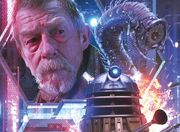
The Doctor observes an eldritch worm on Asteroid Theta 12. (AUDIO: A Thing of Guile)
Travelling to Vildar to destroy the Annihilator, the Doctor was assisted by a reluctant soldier named Collis, but she was killed protecting him from a Varga plant. Knocked unconscious by the destruction of the Annihilator, the Doctor was deemed dead and taken to Aldriss, the planet of the Technomancers that had been reviving dead Time Lords, such as Collis. Discovering that the Valdarians were being sacrificed to revive the dead, and that a small part of the Technomancer's masters, the Horned Ones, were being placed in the revived Time Lords, the Doctor and Collis ran to the Crypt of Non-Time, where the Annihilator resided after the Doctor had used it to wipe itself from time. After Collis died at the hands of the Technomancer leader, Shadovar, the Doctor set the Annihilator off, wiping the Technomacers and the Horned Ones from time.
Escaping Aldriss with co-ordinator Jared, the Doctor was apprehended by Ollistra, who informed the Doctor that he was to be arrested as a war criminal. (AUDIO: Legion of the Lost) The Doctor was placed in an Artron leash, and tasked with discovering the purpose of the anima device on Asteroid Theta 12 with Ollistra, Jarad and Captain Solex. After losing Jared, they discovered that the Daleks were retro-engineering themselves back into Kaleds in order to gain a new insight into war. After Solex sacrificed himself to save him, the Doctor allowed Ollistra to use the anima device for their escape and then freed himself from the Artron leash to leave in his TARDIS. (AUDIO: A Thing of Guile) However, Ollistra had programmed the TARDIS to travel into the explosion of the anima device; the Neverwhen. There, the Doctor initially helped a set of soldiers against an aggressor, until the time phasing revealed he had been assisting retro-evolved Kaleds battle primitive Time Lords.
Once Ollistra caught up with him, and told him to dismantle the Neverwhen so that she can use it in conjunction with the anima device to destroy Skaro, the Doctor instead stopped it from working in the first place, attempting to use it to create a state of peace where both Daleks and Time Lords were farmers. However, the conflict was so ingrained that the residents of the new timeline still ended up fighting. When Ollistra insisted on resuming her initial plan, the Doctor modified the Neverwhen so that the experiment would be deemed a failure, as he felt that there was no way to predict the side-effects of Ollistra's plan on the wider universe. (AUDIO: The Neverwhen)
Missions of war
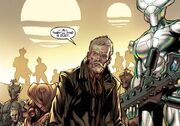
The Doctor watches a trap go off among a group of paradox-evolved Voord. (COMIC: Four Doctors)
During the year A10%? on the planet Marinus, the Doctor assisted the Voord in setting up a chronic tripwire against the Daleks. After a Dalek flying saucer fell into the trap, and the Daleks onboard turned to dust, the Doctor and the Voords went in to investigate, but not before the leader's Paradox Shield failed and he passed on his leadership and liquid-metallic bodysuit in his last moment.
Inside the downed saucer, the Doctor talked with a Voord named Siatak about how the Time War had caused the Voord to become more formidable beings, and Siatak's fears of the Time Lords reverting the Voords' development in the event they won the war. As his relationship with the High Council was complicated, and due to his inability to make grand promises in wartime, all the Doctor could do was to offer to act as an intermediary for the Voord if the Time Lords were still prepared to listen to him after the war, though this did not stop Siatak from fearing the future. (COMIC: Four Doctors)
Opposing the Dalek Time Strategist
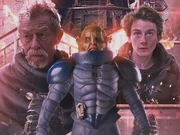
The Doctor and Kalan with Fesk. (AUDIO: The Eternity Cage)
The Doctor was sent to Earth by Ollistra to stop the Dalek Agent Lara Zannis from operating the Shadow Vortex in 1961 Berlin, but they were both captured by the Stasi in East Berlin and interrogated by Kruger. After Zannis escaped, the Doctor convinced Kruger to release him, and they made their way to West Berlin to stop her, only to arrive too late. In order to stop the Dalek invasion, the Doctor materialised around Zannis and the Shadow Vortex, took them back in time by a few minutes, and landed on top of Zannis's past self, separating the two timelines and trapping Zannis in an alternate timeline.
Returning to the Time War, the Doctor was informed by Heleyna that Ollistra had been kidnapped. (AUDIO: The Shadow Vortex) He devised a plan to get onto Rovidia to rescue Ollistra from the Sontarans, who were also ransoming the Dalek Time Strategist to the Daleks. Using a stealth ship, the Doctor and Heleyna led a platoon of Time Lords with Muren arrived on Rovidia and, with the help of Kalan, they got to the citadel where the Sontarans were holding Ollistra. While experiencing a psychic pain, the Doctor came to realise that the Sontarans were aiming to become a third front in the war and that their hostages were bait for a trap.
Stopping the Sontarans from using the Eternity Cage with the aid of Vassarian, the dying Time Lord powering the cage, the Doctor managed to escape in Vassarian's Battle TARDIS with Ollistra, Kalan and Heleyna, only for Ollistra to expose Heleyna as a traitor. Heleyna tried to kill the Doctor by ejecting him from the TARDIS, (AUDIO: The Eternity Cage) but Ollistra used the TARDIS' transmat to bring him back on the ship after Heleyna was dealt with. However, Heleyna was able to escape into the ship with Ollistra, leaving the Doctor and Kalan to avoiding her traps as they searched for them.
The Doctor and Kalan eventually located them at the Eye of Harmony chamber, just as the Dalek Time Assault Squad arrived in the ship. He used Heleyna's idea of manipulating the reconfiguration system and destroyed the chamber to stop the Daleks, stranding the TARDIS in the Vortex. With Kalan fatally wounded, the Doctor convinced Heleyna to detonate a Dalek Dark Matter bomb to give the TARDIS enough energy to materialise into real-time, at the cost of her life. (AUDIO: Eye of Harmony) Escaping the Time Vortex to a space station, (AUDIO: Pretty Lies) Kalan died from his injuries as the Daleks arrived after them. (AUDIO: Eye of Harmony) The Doctor and Ollistra were then captured and sent to the Daleks as a peace offering, but the Doctor managed to avoid capture by flying the capsule to Beltox.
Crashing on the planet, the Doctor and Ollistra were met by journalist Schandel, who wanted to interview the Doctor as a war hero, much to his irritation. After Schandel let slip that the Daleks were due to arrive on Beltox, the Doctor alerted the locals in the city of Fergil, and helped to defend them by augmenting their climate control system to become a shield. When Schandel offered his assistance, the Doctor realised he could trick the Daleks into thinking that he had tremendous firepower by editing a message to them, securing his victory. After Schandel was killed by a Dalek straggler, the Doctor and Ollistra took Schandel's time ship to its next destination in the hopes they could contact Gallifrey. (AUDIO: Pretty Lies)

The Doctor and Leela face the Dalek Time Strategist. (AUDIO: The Enigma Dimension)
Learning of someone called the "Lady of Obsidian" from Schandel's files, the Doctor asked Rosata Laxter to help him locate her while Ollistra remained on Grend to contact the Time Lords. Arriving at the Obsidian Nebula, the Doctor discovered that the Lady was really Leela, who had been struck by a Disruptor Dalek early in the War and displaced from time and space until she reformed with her memories altered to include all of her possible timelines. The Doctor was able to convince Leela of their shared history and friendship and helped her close a breach that caused the Unlived to get into the universe, though at the cost of Rosata's life.
With Ollistra having contacted the Time Lords, the Doctor was reunited with his TARDIS, and took Ollistra and Leela back to Gallifrey. (AUDIO: The Lady of Obsidian) When Leela began feeling a sadness and seeing Dalek shadows on Gallifrey, the Doctor and Ollistra found a force from another universe called the Enigma was communicating with them through Leela, before it erased the Time Lords from history on the orders of the Dalek Time Strategist.
Escaping the onslaught in his TARDIS, the Doctor, Ollistra and Leela ventured into the Enigma's dimension, where the Doctor learned that the Enigma was being forced to the Daleks bidding and was using emotions to communicate with Leela, and had given the Doctor a warning due to Leela's trust in him. While Ollistra wanted to use the Enigma to restore the Time Lords and wipe out the Daleks, the Doctor instead chose to ask it to bring an end to both races to truly end the Time War. However, the Enigma chose to do neither, restoring the Time Lords after the Daleks and the TARDIS were ejected from its dimension. (AUDIO: The Enigma Dimension)
Final fights
The Doctor travelled back to Gallifrey during the First Segment of the War to stop the Daleks from wiping out Gallifreyan children. He went to the munition factory inside the Mountain of Serenity and saved Rojan, Gahnna and several other children from a Dalek attack, but Senior Tahl chose to sacrifice himself to save the children from the Daleks. Entrusting Rojan with the children's safety, the Doctor left in his TARDIS. (PROSE: The Stranger)
The Doctor opposed Ollistra's idea to recruit the Great Vampires into the Time War. To this end, he travelled to Space Station Zenobia II to prevent Councillor Voltrix from opening a rift into the Vampires' universe, but his protests fell on deaf ears. (COMIC: The Bidding War)
Late in the War, the Doctor was ordered by Lord President Rassilon to find the War Master, who had fled from the War, but the Doctor couldn't find any trace of his old enemy. (PROSE: Engines of War)
In the last month of the War, the Doctor enlisted the help of Dorium Maldovar to help him destroy the thirteen weapons factories of Villengard before the Dalek Fleet arrived to take control of them. Using a molecular fruit bomb, the Doctor transformed the factories into palm trees, creating a banana grove. After Dorium told him he was now out of a job, the Doctor told him to open a bar. (COMIC: The Whole Thing's Bananas)
Events in the Tantalus Eye
Leading a flotilla of Battle TARDISes to the Tantalus Eye to engage the Daleks, the Doctor crashed on Moldox after evading his TARDIS out of the way of a Dalek stealth ships ambush that wiped out the flotilla. On Moldox, the Doctor met Cinder, and used her help in investigating a Dalek base, where he found Temporal Weapon Daleks, a new breed of Dalek that possessed weaponry capable of removing living creatures from existence, and discovered that the Eternity Circle of Daleks were building a De-mat weapon in a plan to wipe Gallifrey from history so they could win the Time War.
The Doctor took Cinder to Gallifrey in order to warn the Time Lords of the Daleks' plan. The Doctor told Rassilon and the High Council of the Daleks' plan, and Rassilon decided to use to Tear of Isha to wipe the Dalek presence from the Eye, killing all other life in the area in the process. The Doctor was against this plan, so Rassilon had him and Cinder thrown into a prison cell.
With Cinder's help, the Doctor broke free of the prison. Picking up Karlax, who was now was on the verge of regenerating after ambushing the TARDIS, the Doctor and Cinder escaped to the Death Zone in order to find Borusa, whom Rassilon was using as a possibility engine to predict the outcome of battles in the War. After leaving Karlax to recover in the Zero Room, the Doctor and Cinder travelled to confront the Daleks near the Tantalus Eye after disposing of the Tear in the distant future. The Dalek leaders attempted to forcibly convert the Doctor into the prototype of the new Predator Dalek — unable to comprehend that doing so would deprive the Doctor of the very advantages they sought to harness but they were saved when Karlax recovered from his regeneration and tried to escape in the TARDIS, which responded to a program that the Doctor had added that would cause it to home in on a tracking signal implanted in Cinder by the Time Lords. Outraged, Karlax attempted to kill the Doctor, but Cinder jumped in the way of the blast to protect him. In revenge, the Doctor set the TARDIS to leave Karlax behind as it dematerialised, leaving him to be exterminated on board a Dalek command station. Bleeding to death, Cinder died on the floor of the TARDIS.
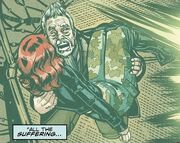
A distraught Doctor cradles Cinder's body. (COMIC: The Bidding War)
The Doctor had the opportunity to use Borusa's possibility engine to create an alternate timeline where Cinder survived but knew she would have preferred that he ensure the Eternity Circle of Daleks never existed. The Doctor took Borusa to the Tantalus Eye, the proximity of which gave Borusa the ability to change the timelines to his preference. The Doctor used Borusa to wipe out the Dalek presence from the Eye, thus ending the Dalek plan, but at the price of Borusa's death.
The Doctor then journeyed to Moldox after going around searching for information about how to find the cadavers of Cinder's deceased family, who were all murdered by Daleks and left to rot in the ruins of their own home. The Doctor buried the skeletal remains of Cinder's mother, father and brother along with Cinder's body, and erected a wooden grave marker that bore her real, beautiful human name. After paying his respects to the fallen family, he stood and looked defiantly at the Tantalus Eye. In honour of Cinder's death, the Doctor vowed to put an end to the War once and for all, promising "no more". (PROSE: Engines of War)
Last day of the War
After fighting the Time War for "a very long time", (TV: The Day of the Doctor) the Doctor learnt of Rassilon's plan to rupture the Time Vortex and destroy the universe and took it upon himself to end the war. (TV: The End of Time) After using a stolen gunship to burn "NO MORE" into the Dalek City on Skaro, destroying most of the Dalek Emperor's fleet in the process, (PROSE: The Day of the Doctor) he was able to breach the Omega Arsenal, a repository of forbidden weapons, and took the Moment, a weapon of ultimate destruction which had developed a sentience and conscience of its own. (TV: The Day of the Doctor)
The Doctor appeared at the fall of Arcadia, (TV: Doomsday) in the midst of an attack by the combined Dalek Fleet of about ten million ships (TV: Dalek) with a "billion billion" Daleks descending on Gallifrey. His presence baited several Daleks away from innocent Gallifreyan refugees fleeing the ravaged city, who became solely concerned with eliminating him, as he used a soldier's gun to inscribe the words "no more" onto a wall as a message to the Time Lords and the Daleks. He then destroyed the group of Daleks with his TARDIS as he left, (TV: The Day of the Doctor) disappearing from Time Lord observation (TV: The End of Time) into the Drylands of Gallifrey, (TV: Hell Bent) leaving only a warning to the Time Lords and the Daleks that the war had carried on "for too long" and he would end the war that day.
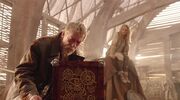
The old and tired Doctor speaks with the Moment as he prepares to end the Time War. (TV: The Day of the Doctor)
Choosing to activate the Moment far away from his TARDIS so that it would not witness the terrible act he was about to commit, (TV: The Day of the Doctor) and acting on a dream he had had in his childhood, the Doctor retreated to the barn he slept in as a child, (TV: Listen) where the Moment's interface manifested into the form of Rose Tyler, a future companion of his, to challenge his use of the weapon and warning him that he would one day count the innocent children on Gallifrey that would be among those killed if he used the weapon.
Upon realising that the Doctor saw no other way to end the Time War than by using it, the Moment created a time fissure that sent him into his future, in order to witness the effects that making such a choice would have upon him. He met with the Tenth and Eleventh Doctors in 1562 England and ended up thrown in the Tower of London by Queen Elizabeth I, posing as a Zygon the Tenth Doctor had been tracking. Not realising that she left their cell door unlocked, the War Doctor placed the calculation to disintegrate the structure of the prison door as a permanent subroutine in the sonic screwdriver, which was completed by the Eleventh Doctor's time. Before they could put the calculations to use, the Eleventh Doctor's companion, Clara Oswald, opened the unlocked door, freeing them, but they were unable to escape from the Queen.
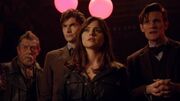
The Doctor sees Zygons prepare for invasion with his successors and Clara Oswald. (TV: The Day of the Doctor)
Elizabeth, revealing her masquerade, showed the Doctors that the Zygons were placing themselves inside stasis cubes so that they would awaken when Earth became a more advanced place to invade. Realising the Black Archive, which the Zygons had taken over in Earth's future, was impenetrable from the TARDIS, the War Doctor deduced a way in, which involved the Eleventh Doctor ordering McGillop to place the stasis cube, Gallifrey Falls No More, inside the Archive before the Zygon attack. The three Doctors and Clara froze themselves inside the cube, where they fought a Dalek and blasted their way into the Black Archive. The Doctors wiped the minds of Kate Stewart, Osgood, McGillop, and the Zygons impersonating them, forcing them to cancel the detonation of a nuclear weapon beneath the Archive and begin peace talks between the humans and Zygons, as neither side knew which group they belonged to.
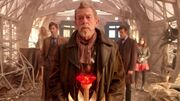
The Doctor's future selves arrive to support him. (TV: The Day of the Doctor)
Feeling that the regret his future selves felt for destroying Gallifrey had led them to save many worlds, the War Doctor, after speaking with Clara, decided to activate the Moment. However, the Tenth and Eleventh Doctors joined him to press the button, finally forgiving him and themselves for the atrocity they committed, until Clara insisted that they find another way. After the Moment showed them a projection of the suffering of the Time War, the Eleventh Doctor decided not to use the Moment and came up with a plan that involved saving Gallifrey.
Informing the General of their plan, the Doctors were joined by their nine other incarnations, as well as a future incarnation, to freeze Gallifrey in a pocket universe. The General was sceptical of their plan but gave the order when the Dalek army increased their attack. All thirteen Doctors managed to move Gallifrey and destroyed the Daleks. Meeting up at the National Gallery, the War Doctor voiced his uncertainty of their success to the Tenth and Eleventh Doctors, but took solace in the fact they may have "failed at the doing the right thing, as opposed to succeeding in doing the wrong". He was pleased that he could call himself "the Doctor" once again, even if it was for mere moments. Reminding himself that he would forget his attempt to save Gallifrey due to the timelines being out of sync, the Doctor bade farewell to Clara and his future selves and left in his TARDIS. (TV: The Day of the Doctor)
Death
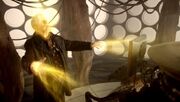
The Doctor regenerates in his TARDIS. (TV: The Day of the Doctor)
As soon as he set the TARDIS for flight, the Doctor noticed that his regenerative process had triggered automatically. Commenting on how his body was "wearing a bit thin", the Doctor mused how he hoped his next incarnation's ears would be "a bit less conspicuous", as he regenerated with a peaceful smile on his face. (TV: The Day of the Doctor)
His successor would once again use the name "Doctor" after he regenerated, (TV: Rose) but, due to the timelines being "out of synch," he lost all memory of what had happened at the end of the Time War, (TV: The Day of the Doctor) believing that he had destroyed Gallifrey, and that he was the last of the Time Lords, (TV: The End of the World, Dalek) leaving him and his two successors with an intense hatred of their war incarnation, (TV: The Name of the Doctor, The Day of the Doctor) while the Time Lords hailed him as a war hero. (TV: Hell Bent)
Post-mortem
While the Doctor made no secret of his part or actions in the Time War, (TV: Rose, Dalek, Doomsday, The Sound of Drums, The Doctor's Wife) he instead chose to reject who he was during the war, considering that incarnation to be "the one who broke the promise" of his chosen name as "the Doctor". (TV: The Name of the Doctor, The Day of the Doctor) When memories of life as the Doctor were passed on to John Smith, his detailed illustrations of past incarnations' faces included all but this one. (TV: Human Nature) However, despite his attempts to forget, the Doctor occasionally thought about his war incarnation, (PROSE: Nothing O'Clock) and even confided his existence to River Song. (TV: The Husbands of River Song)
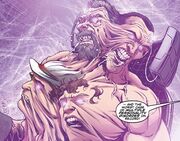
The War Doctor tries to emerge from a Sin-Eater. (COMIC: Sin-Eaters)
When the Ninth Doctor's Sin-Eater became conscious due to the Doctor's telepathic nature, it mutated to show the War Doctor's face, among other incarnations, straining against its body. (COMIC: Sin-Eaters)

The War Doctor emerges as a failed duplication of the Tenth Doctor. (COMIC: Breakfast at Tyranny's)
During many failed attempts to duplicate the Tenth Doctor, defective copies of all his past incarnations were created instead. This included the War Doctor. (COMIC: Breakfast at Tyranny's)
When the Eleventh Doctor first examined his new face in a mirror, he heard the voice of his war incarnation challenge his claim of only having eleven faces. (PROSE: The Day of the Doctor)
When the Then and the Now attempted to ingest the Eleventh Doctor's timeline, the Doctor briefly retro-regenerated back into the War Doctor. Being an "X-rated" period of his life that the Doctor resisted, this halted the ingestion. (COMIC: Outrun)

The Eighth Doctor defends the War Doctor's actions, as the War Doctor remains quiet. (COMIC: Dead Man's Hand)
When the Eleventh Doctor entered into the T'keyn Nexus in order to defend himself, Matrix projections of his previous incarnations appeared inside it to defend themselves as well, though the War Doctor decided not to defend himself, leaving it to the Eighth Doctor to defend his actions in the Time War. When the Eleventh Doctor began to deduce Sondrah's true identity, the past Doctors faded away as Oscar Wilde interfered with the Nexus. (COMIC: Dead Man's Hand)
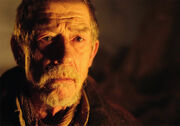
A doleful-looking Doctor within the Doctor's time stream. (TV: The Name of the Doctor)
When the Eleventh Doctor entered his time stream to save Clara Oswald, he encountered his war incarnation, who he described as "[his] secret". The War Doctor reminded his future self that the action he took was in the name of peace and sanity; though not in the name of "the Doctor". As the Doctor carried an unconscious Clara away, the War Doctor turned around and watched them with a sombre stare. (TV: The Name of the Doctor)
The War Doctor appears in the Eleventh Doctor's dream. (TV: The Day of the Doctor)
Ultimately, the Doctor remembered the true result of the Time War. After reassessing the War Doctor, his tenth incarnation declared that the war incarnation had been "the Doctor more than anybody else", while the eleventh incarnation noted that the War Doctor was "the Doctor on the day it wasn't possible to get it right". They forgave their war incarnation and themselves for the atrocities they committed and honoured him by addressing him as Doctor again.
Later, as the Eleventh Doctor dreamed about his search for Gallifrey, he included his war incarnation alongside his ten other predecessors in the dream, further showing his acceptance of the War Doctor. (TV: The Day of the Doctor)
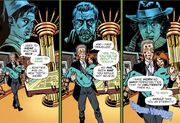
The War Doctor appears in the Twelfth Doctor's memory. (COMIC: Petals)
While the Twelfth Doctor was on the planet Eed'n, he became infected with pollen from the plants and possessed by the entity that controlled all of Eedin's plants, but he was able to fight off the possession by summoning the memories of his past incarnations, such as the War Doctor. (COMIC: Petals)
When he was exposed to energy from a time storm, the Twelfth Doctor degenerated through all of his previous incarnations, including the War Doctor. (AUDIO: The Lost Magic)
Alternate timelines

The Doctor prepares to use the Moment to end the war against the Cybermen. (COMIC: Prologue: the War Doctor)
When the Cybermen allied with Rassilon to take over history, the War Doctor fought the Time War against the Cybermen, ultimately detonating the Moment inside the barn as it was surrounded by Cybermen. (COMIC: Prologue: the War Doctor)
Psychological profile
Personality

The Doctor's traumatised reaction when shown a glimpse of the suffering on Gallifrey. (TV: The Day of the Doctor)
Full of self-doubt and self-loathing, the War Doctor not only thought himself unworthy of the name of "the Doctor", (TV: The Day of the Doctor) dispatching the moniker immediately after regeneration, (TV: The Night of the Doctor) along with the "philosophies and ideals" shared with it, (PROSE: The Day of the Doctor) in favour of the title of "Warrior", (PROSE: The Stranger) but also of any identity at all, eventually leaving it to others to choose how they wished to address him, (PROSE: Engines of War) as he did not carry a name "as a rule". (AUDIO: The Eternity Cage) He would show great irritation, and even extreme bouts of anger, if anyone called him by his former title, especially if they did so after he committed what he considered an atrocity. (AUDIO: The Innocent, The Thousand Worlds, The Neverwhen, Eye of Harmony, The Enigma Dimension; COMIC: Kill God, Physician, Heal Thyself, The Clockwise War; PROSE: The Third Wise Man)
Rather than a "good man", the War Doctor saw himself as a "lost cause" that did what was necessary to end a "sorry chapter of cosmic history", as it was his "reason for being." (AUDIO: The Innocent) His inability to find an alternative to end the Time War consumed him with so much guilt he considered it easier to view himself as a different man to the Doctor. (AUDIO: The Neverwhen) He even made himself believe that he had "killed" "the Doctor" on Karn. (PROSE: The Day of the Doctor) He did not see himself as a "hero", (AUDIO: Pretty Lies) instead thinking himself as a "monster" that was "steeped in the blood of war", (AUDIO: The Innocent) becoming "the stuff of nightmares" and "a demon let loose on the time streams". (AUDIO: Pretty Lies) However, he would immediately turn apologetic when he realised that he had stepped out of place, (AUDIO: The Innocent) and considered himself on the side of the collateral in the war, with the idea of having to sacrifice innocents weighing heavily on him. (AUDIO: Legion of the Lost)
During his first years fighting in the Time War, the Doctor saw the conflict as "a challenge to overcome", and showcased an arrogant and egotistical persona, not unlike his sixth incarnation. He made puns in the face of the Morlontoa, and viewed himself as "handsome", "brilliant", and "modest", though Fey Truscott-Sade instead described him as "irritating". Following the loss of Fey, the Doctor came to see the war as a "tragedy to face". (COMIC: The Clockwise War) Due to the intensity of his life brought on by the Time War, the Doctor would show genuine surprise when arriving somewhere that hadn't been touched by the fighting. (AUDIO: The Innocent)
As he grew older, the Doctor wanted the war to end, but felt it was his duty to continue to fight and play his part. (AUDIO: The Innocent) Despite wanting to see the hostilities end, he did not believe peace with the Daleks would ever be possible. (AUDIO: The Heart of the Battle) He took peace in the certainty of death, as the one dependable constant. (AUDIO: Legion of the Lost) For a while, he wished for his own death, so that he would have to face such choices no more. (AUDIO: The Innocent, The Heart of the Battle)
The War Doctor could be cagey and cranky, but would return the kind treatment he received from those who did not antagonise him if he was in a good enough mood. (TV: The Day of the Doctor; AUDIO: The Innocent, The Eternity Cage) He was overjoyed to be reunited with Leela, (AUDIO: The Lady of Obsidian) and the two quickly regained their old rhythm of teamwork. (AUDIO: The Enigma Dimension) He also made a point to be nice to fellow soldiers, and inspire them to continue. (AUDIO: The Neverwhen) While he did not accept acts of gratitude for his actions, he would ask for peace and quiet as a reward when the opportunity presented itself. (AUDIO: The Innocent)
He acknowledged that the Time War had changed him, (PROSE: The Stranger; AUDIO: A Thing of Guile) making him renounce offering chances to his enemies (COMIC: Kill God) and unable to make the same promises his previous incarnations could, (COMIC: Four Doctors) recognising that his previous selves would hate what he had become, (AUDIO: The Neverwhen) and also reflected how he was a lesser man than his successors, having become great men from the guilt they suffered from his actions. On meeting his future selves, the War Doctor viewed it as his privilege to light the flame that would forge their greatness. (TV: The Day of the Doctor)
He would also state the facts without thought for niceties or the fear he was spreading through these facts. (PROSE: Engines of War; AUDIO: The Innocent, The Eternity Cage, Pretty Lies) He could also be stern, as indicated by his dislike for childlike vocabulary, considering the fact that the Eleventh Doctor used such words as a proof that he was ashamed of being a grown-up. He berated his future selves for pointing their sonic screwdrivers as weapons, calling the screwdriver a "scientific instrument, not [a] water pistol[s]", though later found himself wielding his screwdriver in a similar fashion against an attacking Dalek. (TV: The Day of the Doctor)

The Doctor speaks candidly to Siatak about the state of the war. (COMIC: Four Doctors)
The Doctor was tired of the suffering and anarchy the Time War had caused, having lost the will to survive beyond the war and his self-beliefs, but still maintained a whimsical charm, (TV: The Day of the Doctor) being very attached to his TARDIS and overjoyed when reunited with it after an extended period of time. (AUDIO: The Lady of Obsidian) He also addressed the TARDIS as "old girl", did not wish to get his boots dirty in case he stepped in the TARDIS and made a mess, (PROSE: Engines of War) and reassured Siatak that he would act as an intermediary between the Time Lords and the Voord when the war ended. (COMIC: Four Doctors)
Though the Time War caused the War Doctor to be saddled with much regret, sadness, and weighted guilt, he also managed to be cheerful and compassionate with a few moments of witty humour and sarcasm, such as throwing Veklin's rude comments back at her with a laugh, (AUDIO: The Innocent) refusing to identify himself after his interrogator demanded his silence, (AUDIO: The Thousand Worlds) wryly replying that he felt "terrific", when questioned by Jarad, (AUDIO: Legion of the Lost) mocking Kruger's attempt to intimidate him during an interrogation, (AUDIO: The Shadow Vortex) laughing at jokes he accidentally made, (PROSE: The Stranger) telling Cinder they had "places to go, [and] people to see" while joyfully sneaking into Andor, joking that the Eternity Circle of Daleks weren't a circle while drawing an imaginary circle in the air with his finger to demonstrate his point, (PROSE: Engines of War) quipping that it was Lord Bentham's "lucky day" for unknowingly stumbling upon three incarnations of the Doctor at once when Bentham threatened the Doctor for apparently bewitching the Queen, (TV: The Day of the Doctor) and pretending not to know which TARDIS was his as a joke for his successors. (PROSE: The Day of the Doctor)
Being open-minded, (AUDIO: Legion of the Lost) the Doctor believed in keeping his word, (AUDIO: The Heart of the Battle) and second chances, taking Cinder on as a temporary companion after she threatened him with a gun, and rescuing Karlax from the ruins of his Battle TARDIS to assist in his regeneration. (PROSE: Engines of War) While he stood by the right for others to possess free will, (AUDIO: A Thing of Guile) he was willing to strip it away if it meant peace. (AUDIO: The Neverwhen) He also thought that those "who would seek the Godhead must first walk with angels", (COMIC: The Organ Grinder) and that, as "great minds [thought] alike", "fools seldom differ[ed]" on strategies. (COMIC: The Lost Dimension)

The Doctor smiles while holding two bananas. (COMIC: The Whole Thing's Bananas)
He enjoyed the fruit juice of Keska, (AUDIO: The Innocent) a good cup of tea, (AUDIO: Legion of the Lost) bananas, (COMIC: The Whole Thing's Bananas) and also considered books, marshmallows and Earl Grey tea specifically to be amongst the "finer things in life", along with the view from the banks of the Rhine, the ash oceans of Astragard and the pleasure of Cleopatra's court. He found the Tantalus Eye to be breathtakingly beautiful, (PROSE: Engines of War) had fond memories of Marinus, describing it as being a "lush world of many ecosystems", (COMIC: Four Doctors) and also maintained his old fondness for Earth, (AUDIO: The Innocent) and had good memories of Vildar. He held a great respect for artists and intellectuals, calling the Vildarans "beautiful". (AUDIO: Legion of the Lost)
The Doctor voiced a continual dislike for working for the Time Lords, claiming he preferred to fight the war alone, on his own terms, (AUDIO: The Innocent, The Thousand Worlds, A Thing of Guile, The Neverwhen) and believed that their dedication to order and discipline made them no different than the Daleks, (AUDIO: The Thousand Worlds) especially when they tried to justify the killing of "lesser beings" in the crossfires of the war. (PROSE: Engines of War; AUDIO: The Heart of the Battle) He was particularly "disgusted" to be on "the same side" as Ollistra (AUDIO: The Heart of the Battle) and Rassilon. (PROSE: Engines of War)
The Doctor would get particularly short-tempered with those he thought were taking too long to think, (PROSE: The Third Wise Man) and also disliked not having the last word in a negotiation. (AUDIO: Eye of Harmony) He also would not stand for being patronised, (AUDIO: Legion of the Lost) and strongly believed that the dead should stay dead, and was horrified to find that the Time Lords had been reviving soldiers over and over again, as mere "cannon fodder". (AUDIO: Legion of the Lost)
Similar to his second and seventh incarnations, the War Doctor was also painfully aware of the need to see the "bigger picture". He knew it would be selfish to undo Cinder's death instead of stopping the Daleks, (PROSE: Engines of War) and that it was entirely proper to sacrifice his people if it would save the universe. (TV: The Day of the Doctor) When his eleventh incarnation questioned him in their time stream on the actions that he had to make during the war, the War Doctor responded by defending those actions, stating he acted "without choice" and that he did what he did "in the name of peace and sanity." (TV: The Name of the Doctor)
Convincing himself to believe he was a different man with different ideals to his predecessors, (AUDIO: A Thing of Guile) the War Doctor was prone to bouts of anger and rage, especially when democracy prevented him from taking action to save lives. (AUDIO: Pretty Lies) He roared in grief for Cinder and the Fifth Time Lord Battle Fleet, and picked up Karlax by the throat and hoisted him in the air when provoked. (PROSE: Engines of War) He sometimes heard a voice in his head that represented "the Doctor" trying to convince him away from violence, but forced himself to shut the voice behind a door in his mind. (PROSE: The Day of the Doctor)
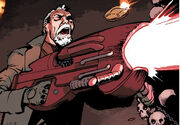
The Doctor fights during the War. (COMIC: Pull to Open)
Unlike his other incarnations, the War Doctor endorsed the use of weapons, holding Dorium Maldovar at gunpoint to coerce his cooperation, (COMIC: The Whole Thing's Bananas) allowing Cinder to bring her gun aboard the TARDIS, using a Temporal Cannon to defend himself from a Dalek, (PROSE: Engines of War) and wielding a gun during the Fall of Arcadia to carve an inscription on a wall. (TV: The Day of the Doctor) He even commented that a gun fitted his hand better than psychic paper did. (COMIC: The Organ Grinder) However, he was known to enter battles unarmed in the War, (TV: Hell Bent) berated Cinder for pointing her gun at him when he showed no hostilities, (PROSE: Engines of War) expressed dismay before using "doomsday weapons", (COMIC: The Organ Grinder) and had a reluctance to have weapons aboard the TARDIS, owing to the fact she didn't like them. (TV: The Day of the Doctor; PROSE: Engines of War)
The Doctor could react mercilessly to a situation; showing delight at the sight of Daleks being killed by a chronic tripwire, (COMIC: Four Doctors) killing Lara Zannis by un-writing her existence, (AUDIO: The Shadow Vortex) boiling Kaled mutants alive, attempting to subject a Dalek to a Temporal Cannon, leaving Karlax to his own death after Cinder's murder, (PROSE: Engines of War) and unceremoniously mowing down attacking Daleks with his TARDIS. (TV: The Day of the Doctor) The War Doctor was also willing to abandon others if they provided no tactful advantage, almost leaving Dalek prisoners to their fates until Cinder convinced him to liberate them. (PROSE: Engines of War) While he still felt grief for the pain he inflicted and guilt for the lives he had to take, the Doctor did not allow his feelings to deter him from his objective to end the war, (PROSE: The Day of the Doctor) and felt despair when he found out the consequences of his hard decisions were undone. (AUDIO: Legion of the Lost, The Enigma Dimension)
However, he believed that mercy was a strength, and valued life above all else. (PROSE: Engines of War) He vehemently opposed the murder of any sentient being, (AUDIO: Legion of the Lost) apart from the Daleks, (AUDIO: The Heart of the Battle) arguing at length with Rassilon about closing the Tantalus Eye, as the result would be genocide on the lives within the Tantalus Spiral in the ensuing destruction. (PROSE: Engines of War) He also hesitated to destroy Gallifrey when forced to think of the innocent children he would kill as a result. (TV: The Day of the Doctor) He refused to kill Project K006 out of pity, (AUDIO: A Thing of Guile) and was unwilling to follow a plan that would have resulted in the Daleks wiping out the Sontarans. (AUDIO: The Eternity Cage)
Despite focusing on the grand scale, the Doctor still had his limits, and would try to employ less "extreme" and more "harmless" measures whenever he could, aiming to allow himself to be the sole casualty of his plans, (AUDIO: A Thing of Guile; COMIC: The Organ Grinder, The Whole Thing's Bananas) and constantly tried to have the Time Lords avoid using dubious and lunatic tactics to win the War. (AUDIO: The Heart of the Battle, Legion of the Lost; COMIC: The Bidding War) He was appalled by the depths Rassilon and the High Council had sunk to in the War, and was both outraged and disgusted when he found out Rassilon had retro-evolved Borusa into a possibility engine. (PROSE: Engines of War)
Throughout his life, the War Doctor continued to try and minimise the damage caused by the crossfires of the Time War, and to save as many lives as he could, (AUDIO: A Thing of Guile, The Neverwhen, The Eternity Cage; COMIC: Kill God) while ensuring that no one sacrificed their lives in vain. (AUDIO: The Innocent, The Heart of the Battle, Legion of the Lost)
Due to the horrors he had seen, the Doctor would often speak in a monotone voice when dealing with individuals he had no interest in. (PROSE: The Third Wise Man) He was accustomed to people looking upon him with terror, (PROSE: The Day of the Doctor) and accepted that the Daleks' schemes for victory would become more hideous and overblown with each attempt. (AUDIO: The Thousand Worlds) He would forget people with "forgettable face[s]", even ignoring them when they stood in front of him. (PROSE: The Day of the Doctor)
The Doctor also displayed a confident recklessness, as he considered politely asking a Dalek to take him and Cinder prisoner to infiltrate Andor, approached a Dalek flying saucer with the intention of walking on board instead of sneaking on, decided his way around the Dalek saucer with "Eeny, meeny, miny, moe", and confidently walked out to meet the Eternity Circle after asking some Dalek soldiers to "take [him] to [their] leader". (PROSE: Engines of War)

Being able to make peace brings great joy to the Doctor. (TV: The Day of the Doctor)
Despite being more concerned with the Time War than defending Earth and the rest of the universe, the War Doctor still cared and was willing to help out when necessary. He aided his other incarnations in stopping the Type 1 TARDIS from consuming the universe, (COMIC: The Lost Dimension) and helped the Tenth and Eleventh Doctors in defeating a Zygon plot, coming up with the idea that let them get into the TARDIS-proofed Tower of London and helping them wipe everyone's memories to ensure peace. He was also shown to be pleased that the outcome of the situation was diplomacy rather than destruction, showing that he still desired peace. Upon learning that he had a chance to save Gallifrey rather than destroy it, the War Doctor became elated, blowing a joyful kiss to the Moment, and took solace in restoring his right to be called the Doctor. (TV: The Day of the Doctor)
The War Doctor did not reflect fondly on his predecessors, believing them to be "posturing, prancing fool[s]" who "lived for the thrill of stepping through a door and seeing all [the] faces turn towards [them] in hope and wonder". (PROSE: The Day of the Doctor) He especially demonised his fourth incarnation for not having "the guts to do what was necessary" when his hesitation to destroy them ensured the creation of the Daleks. (PROSE: Engines of War)
The War Doctor had a low opinion of his eighth incarnation, viewing him as a "romantic idiot", (COMIC: The Lost Dimension) who had the arrogance to "[mistake] himself for a hero" and make jokes at often inappropriate times. (PROSE: The Day of the Doctor)
The War Doctor was critical at first of his tenth and eleventh incarnations, finding them to be very childish and ashamed to be grownups, and branding them a "midlife crisis". (TV: The Day of the Doctor) As a consequence of their youthful appearance, the War Doctor had at first believed them to be children playing dress up, and their sonic screwdrivers to be magic wands. He asked if they were his future companions with some amusement. He also had difficulty telling the two apart. (PROSE: The Day of the Doctor) He was particularly critical of the Eleventh Doctor, disliking his use of the phrase "timey wimey" and his inability to talk without flapping his hands around, while also criticising the Tenth Doctor's footwear and the Eleventh Doctor's bow tie. (TV: The Day of the Doctor) He was particularly annoyed by the apparent lack of dignity and wisdom they showed, likening them both to presenters of Blue Peter. (PROSE: The Day of the Doctor) However, after watching them use their guilt from the Time War to broker peace between UNIT and the Zygons, his opinion of them changed for the better, as he described them as "extraordinary men" to the Moment. When leaving for his own time stream, he considered meeting his future selves "an honour and a privilege", a compliment they returned to him. (TV: The Day of the Doctor)
While the Eleventh Doctor tried to remember his war incarnation as "the slaughterer of billions", when standing before him, he reflected that the War Doctor was "kind, and brave, and hurt", and had never been "a warrior in his hearts". (PROSE: The Day of the Doctor)
Contrary to his other incarnations, the War Doctor did not take on companions unless it was absolutely necessary, or they proved to be capable of defending themselves, instead taking comfort in the sound of the TARDIS control console. (PROSE: Engines of War) He claimed to Rejoice that he also chose not take on companions due to his dislike of them asking questions. In truth, he understood that, in such a war, they would not stay travelling with him for long. (AUDIO: The Innocent)
Despite having a rocky start to their relationship, the Doctor grew to genuinely care for Cinder and tried to force her away from him, worried that he wouldn't be able to protect her from the Time War, having lost so many people already. (PROSE: Engines of War)
While he was willing to frighten them to ensure they understood the seriousness of the war, the Doctor was highly protective of young children. He encouraged Gahnna by telling him that his fear pushed him to achieve, (PROSE: The Stranger) and hesitated to use the Moment when it pointed out that he would slaughter children upon activating the weapon. (TV: The Day of the Doctor)
He was afraid of the powers and capabilities of the Daleks, and the possibility that the Time War would continue after the defeat of the Daleks, with the Time Lords becoming warlike enough to find a different enemy to fight in the Daleks place. (AUDIO: The Enigma Dimension) He also believed them to be even more arrogant than the Time Lords. (PROSE: Engines of War)
While the General considered him a "mad fool", Clara Oswald, when distinguishing him from the Doctor's other incarnations, described the War Doctor as "the warrior". (TV: The Day of the Doctor) Co-ordinator Jarad considered the Doctor a "wily old fox" who could out-think everyone. (AUDIO: Legion of the Lost) Rojan, after seeing the War Doctor's elderly face, felt that he "wasn't a man who found much joy in life." (PROSE: The Stranger)
The Squire recalled how the War Doctor carried "pathos" with him, (COMIC: The Then and the Now) but noted that he was still a "noble warrior". (COMIC: Outrun) Ollistra, however, believed that, instead of being a "man of war", the War Doctor sometimes allowed himself to think of himself as a "compassionate man with high moral standards", (AUDIO: The Heart of the Battle) though the War Master commentated how the War Doctor's "morals [were] entreatingly fluid". (COMIC: The One)
Due to the severity of the war, the Doctor was convinced there was no future beyond the conflict, (TV: The Day of the Doctor; COMIC: The Organ Grinder) and did not mind if he died whilst fighting in the Time War, (COMIC: Kill God) having resigned himself to death "the moment [he] entered [the] war", (AUDIO: Legion of the Lost) and would put himself in situations that he had a low chance of surviving in, (AUDIO: The Innocent) with the mind-set that he would "[go] out fighting". (PROSE: Engines of War) However, he stated he had a reluctance to die at Collis's hand, (AUDIO: Legion of the Lost) and that he did not wish to become a martyr. (AUDIO: Eye of Harmony) He claimed that the only thing that was worth living for was the thought of the lives he had saved. (AUDIO: Pretty Lies)

The Doctor smiles as he regenerates. (TV: The Day of the Doctor)
Upon noticing his regeneration beginning, the Doctor showed no fear of the change, (TV: The Day of the Doctor) despite once describing regeneration as a "trauma", (AUDIO: Legion of the Lost) due to having held back the process for "years". (PROSE: The Day of the Doctor) Instead, he noted how old he had grown, hoping his successor's ears would be "less conspicuous", and facing the end with an immense grin on his face for his last moments. However, due to the timelines not being synchronised, the Doctor believed he had destroyed Gallifrey, committing genocide against the Time Lords and the Daleks. (TV: The Day of the Doctor) As such, the War Doctor's memory was known to stare sombrely in the Doctor's time stream, (TV: The Name of the Doctor) not even defending his action to Es'Cartrss in the T'keyn Nexus. (COMIC: Dead's Man Hand)
Habits and quirks
The War Doctor made a habit of incorporating "no more" into his dialogue and thought process, (TV: The Night of the Doctor, The Day of the Doctor; PROSE: Engines of War, The Day of the Doctor; AUDIO: The Eternity Cage; COMIC: Ambush) and justifying his actions as being done in "the name of peace and sanity." (TV: The Name of the Doctor; COMIC: First Rule, Kill God, Fast Asleep) He also made a habit of uttering "damn", usually as a sign of frustration or when things did not meet his satisfaction. (PROSE: Engines of War; AUDIO: The Innocent, The Thousand Worlds, The Heart of the Battle, A Thing of Guile, The Neverwhen, Eye of Harmony, Pretty Lies, The Enigma Dimension)
Much to the confusion of his fellow Time Lords, the Doctor was prone to making reference to Earth idioms and phrases. (PROSE: Engines of War; AUDIO: The Innocent, The Thousand Worlds, A Thing of Guile, The Neverwhen, Pretty Lies, The Enigma Dimension)
The War Doctor would often stand with his arms folded behind his back. (TV: The Day of the Doctor; PROSE: Engines of War; COMIC: The Organ Grinder) When standing between two people engaging in conversation, such as the Tenth and Eleventh Doctors, the War Doctor would turn his head to face the one that was speaking, even if it meant turning his head back-and-forth. (TV: The Day of the Doctor)
Skills
The War Doctor had a strong knowledge of warfare tactics, (AUDIO: The Innocent, The Neverwhen, The Eternity Cage, Pretty Lies) and could deduce a person's history from sheer observation. (AUDIO: The Shadow Vortex) He could also deduce height and weight of people and locations on sight, (PROSE: The Day of the Doctor ) and had a keen grasp on his surroundings, enough to know when he was being observed from behind. (AUDIO: The Innocent; PROSE: The Day of the Doctor)
The Doctor had a knack for gaining authority over others, being able to gain entry into secure locations by acting as if he was in charge, (AUDIO: The Shadow Vortex) and securing his entrance into Time Vault Zero by barking orders about a break-in at the guard until she was convinced to let him in. (PROSE: The Day of the Doctor) Even so, he favoured direct action over feigning authority. (AUDIO: Legion of the Lost)
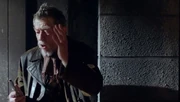
The Doctor discovers a time-managing solution to unlock a cell door. (TV: The Day of the Doctor)
Though not as quicksilver as his more able-bodied successors, the War Doctor paced his thinking, sometimes seeing a hidden solution after much contemplation. (TV: The Day of the Doctor) Though he told Cinder he "was not good with long-term plans", and preferred "winging it", (PROSE: Engines of War) the Doctor was able to think of effective stratagems in preparation for battle, (AUDIO: The Eternity Cage) with the Squire remembering him as "always [having] a plan". (COMIC: The One) Indeed, the Doctor had the foresight on one occasion to surrender to the Daleks, knowing that they would bring him where he wanted to go instead of exterminating him on the spot. He also put a fail-safe on the TARDIS control console that caused his ship to materialise around him in the event that Karlax attempted to hijack it after his regeneration. (PROSE: Engines of War)
Despite his aged appearance, the War Doctor was spritely athletic, being able to outrun a squadron of Daleks ahead of Cinder, and immediately start a daunting climb up a wall afterwards, as well as being capable of dodging a Dalek gunstick at close range. He was also stronger than he appeared, hoisting Karlax in the air by his throat, after marching over the High Council table, in retaliation for using the mind probe on Cinder, and knocked out a Battle TARDIS pilot with a single right hook punch. (PROSE: Engines of War)
The Doctor was also an impressive marksman, able to inscribe "NO MORE" onto a wall with a gun, and keep his aim despite a battle taking place around him, (TV: The Day of the Doctor) and to wield a Temporal Cannon against a Dalek. (PROSE: Engines of War) He was even able to quickly review the effectiveness of a firearm after close examination. (AUDIO: Pretty Lies) However, like his predecessors, the War Doctor was better known for his ability to defeat enemies without employing weapons, though rather than show his enemies mercy, he would kill them outright, as indicated by Gastron. (TV: Hell Bent)
He was skilled at hacking into the Daleks' databanks, (PROSE: Engines of War) as well as the Technomancer equivalent of a computer. (AUDIO: Legion of the Lost)
He was also able to determine the way casualties on the battlefield were killed by studying their corpses. (COMIC: The Organ Grinder)
He could detect nitrogen in the air by scent. (AUDIO: A Thing of Guile)
Due to his third incarnation watching stunt pilots with the Brigadier, the War Doctor was able to pilot his TARDIS through a series of manoeuvres with ease. (PROSE: Engines of War)
The War Doctor could understand Dalek writing, at least to a degree. (PROSE: Engines of War)
Much like his fourth incarnation, the War Doctor could judge a person's character quickly, almost instinctively knowing who he could ally himself with, (AUDIO: The Shadow Vortex; PROSE: The Day of the Doctor) and recognising when someone wasn't a murderer, (PROSE: Engines of War) or was acting out of fear instead of malice. (AUDIO: The Shadow Vortex)
He could assess his surroundings with ease, easily determining that the power pack of Cinder's makeshift gun was empty and the weapon useless, (PROSE: Engines of War) knowing the equipment others had on them by observing their use of technology, (AUDIO: The Innocent) ruling out the Moment's interface as a hologram by observing their surroundings, and determining the year as the 1560s by studying his location. (PROSE: The Day of the Doctor)
Appearance
The War Doctor originally had a stern and determined face, green-brown eyes and messy brown hair following regeneration. Though he started off cleanly shaven, (TV: The Night of the Doctor) he let his stubble grow (COMIC: Ambush) until he grew a full brown Van Dyke beard. (COMIC: The Lost Dimension)

The Doctor in his TARDIS near the end of his life. (TV: The Day of the Doctor)
However, after spending "a very long time" fighting in the Time War, (TV: The Day of the Doctor) he became jaded and tired, with his beard having gone grey and pronounced wrinkles on his craggy, careworn face, resembling a man in his seventies. (TV: The Name of the Doctor; PROSE: Engines of War) However, Clara noticed his eyes were younger than those of his future selves, in that they were more hopeful. (TV: The Day of the Doctor) His hair colour turned largely into a deep silver, which he slicked up in peaks at the top of his head, (TV: The Name of the Doctor) leading Kalan to nickname him "Greybeard". (AUDIO: The Eternity Cage)
His deep, distinctive voice also became well-known amongst the people aware of the Time War, (AUDIO: Pretty Lies) with the Tenth Doctor noting how it was "posh, [and] gravelly". (TV: The Day of the Doctor)
Rojan felt the War Doctor looked like he "had been living rough for a long time." (PROSE: The Stranger) Clara Oswald observed that the War Doctor "seemed to carry the smoke of battle with him". (PROSE: The Day of the Doctor)
In his "twilight years", the War Doctor was observed by the Tenth Doctor as looking "small and frail, and afraid", as opposed to "someone to inspire dread", with the Eleventh Doctor seeing him as "broken, and humble." (PROSE: The Day of the Doctor) The War Doctor's aged appearance led his eleventh incarnation to jokingly codename him "Granddad." (TV: The Day of the Doctor)
Clothing
Main attire
The War Doctor wore a distressed leather overcoat, coloured in either light brown (TV: The Name of the Doctor) or black, (COMIC: The Whole Thing's Bananas) and a dark green-brown velvet waistcoat with golden buttons, which had a fob chain attached to it. He also wore aged trousers, a box-frame belt with several fastener pins and studded pinholes, and combat boots adorned with weathered gaiters, which had a few buttons missing. (TV: The Day of the Doctor) For neckwear, the Doctor wore a scarf with either a beige design, (COMIC: The Clockwise War) a red colouring, (COMIC: Ambush) shaded in eggplant purple, (COMIC: The Lost Dimension) long and white, (COMIC: The Whole Thing's Bananas) or knitted in a herringbone pattern. (TV: The Name of the Doctor)
His oldest article of dress was a bandolier across his left shoulder, taken off the body of Cass mere seconds after his regeneration was finished. (TV: The Night of the Doctor) He housed his sonic screwdriver in the bandolier, securing it in a pocket that rested on the far left side of his chest. (TV: The Day of the Doctor)
Other clothes
During a rescue mission to Rovidia, the Doctor adopted a robed appearance to blend in with the Rovidians, justifying the simplicity of the disguise due to the Rovidians being "simple people". (AUDIO: The Eternity Cage)
Behind the scenes
- John Hurt, aged seventy-three when he first appeared on-screen, is the oldest actor to portray the Doctor upon their debut appearance. The second oldest are William Hartnell and Peter Capaldi, who were both fifty-five years old when they made their debut appearances in 1963 and 2013 respectively (with Capaldi being several months older than Hartnell).
- Strax describes this incarnation of the Doctor as having "the look of a battle-hardened warrior" in Strax Field Report: The Doctor's Greatest Secret.
- This incarnation of the Doctor is never named during The Night of the Doctor itself but is described as the War Doctor in the end credits and on the official BBC website[1]. John Hurt is listed as one of the actors playing "The Doctor" in the end credits of The Day of the Doctor and is billed as "The Other Doctor" in Radio Times and the scripts (DWMSE 38). His Character Options action figure is labelled "The Other Doctor," and his Character Options sonic screwdriver toy is labelled "the Other Doctor's Sonic Screwdriver." The subtitles on The Day of the Doctor refer to him as "Old Doctor".
- Additionally, in-universe, it is mentioned that the War Doctor rejected the name of the Doctor, despite others referring to him as such, though, for a time, it was never actually established by what name or title he used to refer to himself. During Engines of War, he informs his new companion Cinder that he was once referred to as the Doctor and leaves it up to her how she addresses him, asking her fellow survivors to simply call him "John Smith" to avoid revealing his true nature as a Time Lord. In The Stranger, he revealed he went by the name "the Warrior" for a time, establishing his true title.
The image of John Hurt as Raskolnikov in the 1979 Crime and Punishment which was the basis for the briefly-seen image of the newly-regenerated War Doctor.
- Though John Hurt was seventy-three when he debuted as this incarnation of the Doctor, special effects were used to blend archive material of the actor from earlier in his life to depict the War Doctor, in a reflection, as looking like a younger John Hurt immediately after the Eighth Doctor's regeneration. The archive image for the young War Doctor was from the BBC's 1979 TV series Crime and Punishment, episode one, in which John Hurt (circa 39) portrayed Rodion Raskolnikov (REF: DWMSE 38). The BBC itself later revealed which shot it was.[2]
- According to Emma Campbell-Jones,[3] Paul McGann played the newly-regenerated War Doctor in the scene where he takes Cass' bandolier after the regeneration. This makes McGann the second actor to technically play two incarnations of the Doctor since Sylvester McCoy briefly played the Sixth Doctor for the regeneration sequence in Time and the Rani after Colin Baker refused to take part.
- Excluding the controversial "Morbius" or "Merlin" Doctors, the War Doctor is the only incarnation of the Doctor to be introduced retroactively, initially existing to serve as a supporting character. All of his appearances predate future incarnations of the Doctor that already debuted, and he shared his screen time with later versions of himself, meaning he never had a distinct televised era as the latest incarnation to exist at the time of his own debut. However, he was given a debut through his own range of audio stories, where the character was now explored as the main protagonist rather than being juxtaposed with later incarnations of the Doctor.
- The War Doctor was the first among the incarnations of the Doctor introduced in the BBC Wales-produced series of Doctor Who to appear in Big Finish Productions.
- He is the only incarnation whose era's version of the Doctor Who theme is featured only in audios.
- He bears the sad distinction of being the Doctor whose actor passed away in the shortest amount of time after his debut, as John Hurt incurred an on-and-off bout with pancreatic cancer in the years to follow his appearances in the television series and audio stories, succumbing to it in early 2017.
- The War Doctor's existence and numberless designation was a workaround in response to the lack of Christopher Eccleston's participation in the 50th-anniversary special. Since the Eighth Doctor had not been shown regenerating into the Ninth Doctor, it left the door open for another incarnation of the Doctor to theoretically exist between the two. As such, Steven Moffat appealed to John Hurt to take up the role because of his famous reputation among British actors, and he also liked the concept of a "mayfly Doctor" who has a short amount of time in existence in the television series before serving their purpose. This caused a permanent disruption in the numbering of the Doctor's incarnations and ultimately accelerated the timetable on his regeneration cycle to be dealt with when Matt Smith left the series.
- When the War Doctor's costume was initially added to the display of Doctor outfits in The Doctor Who Experience, the bandoleer was incorrectly displayed over the right shoulder instead of the left.
- He placed last in the first popularity poll where he was included among choices of favourite incarnation of the Doctor taken by Doctor Who Magazine, not because he was disliked, but because his debut was so recent and sparse in the television series that he was overshadowed, predating the production of his audio adventures and many new stories to continue fleshing him out prior to the events of his regeneration.
- The time period between the broadcasts of the War Doctor's incoming and outgoing regeneration scenes is the shortest of all the Doctor's incarnations. His regeneration from the Eighth Doctor (The Night of the Doctor) and his regeneration into the Ninth (The Day of the Doctor) were broadcast just nine days apart.
- The War Doctor is the only Doctor of the revived series thus-far not to be given a leitmotif on television.
Footnotes
- ↑ The Day of the Doctor - The War Doctor. BBC One - Doctor Who (2013). Retrieved on 2 December 2013.
- ↑ BBC page about Russian novel adaptations
- ↑ http://twitter.com/ohmissjones/status/447565901265924096
External links
| |||||||||||||||||
